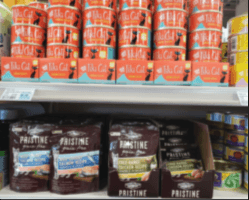“Pet is growing faster than I’ve ever seen it and I’ve been in the business since 1999,” says Bill Bookout, president and chair, National Animal Supplement Council (NASC) in Sun City West, AZ, which represents 90% of the companies in the equine and companion animal supplement market. “A lot of ‘human’ companies are coming to the pet side.”

EuroPharma, Inc. is one of those companies and because of the momentum in the category recently launched a Terry Naturally Animal Health division based on the ingredients that go into its award-winning Terry Naturally brand dietary supplements and natural medicines.
“Some retailers are very sophisticated in providing pet products, and some have not ever carried pet products in their store,” says Cheryl Myers, chief of education and scientific affairs at the Green Bay, WI-based EuroPharma. “Pets are a part of the family. Including even a small section with clinically validated, high-quality pet supplements can help respond to a need,” Myers says. “Quality is more important than quantity. You don’t need to devote a huge section if your space is limited, but make sure what you carry will produce results.”
Just the dog and cat side of the supplement space represent about $1.3 billion in sales, Bookout said, and that doesn’t include food and treats. According to the American Pet Products Association (APPA), U.S. pet owners will spend $72.1 billion on animals, care and supplies this year.
NASC has a regulatory program that includes a quality audit process, Bookout explained. Both retailers and manufacturers can check its website atnasc.cc/members/to identify companies that have gone through a full audit. “We try to do what we do very well,” he says. “I’m a trainer for regulators and industry people. The FDA basically endorses us, which is extremely rare.”
 At the recent IFT18 in Chicago, speakers on a panel about animal health regulation and pet ingredient innovation sounded like they could be talking about human dietary supplements.
At the recent IFT18 in Chicago, speakers on a panel about animal health regulation and pet ingredient innovation sounded like they could be talking about human dietary supplements.“People are looking for solutions beyond basic nutrition,” said Laura Egnash, who at the time was a scientist with Covance Food Solutions. In addition, trending ingredients also mimic what’s trending in products for humans – things like honey and turmeric.
An example from Myers of EuroPharma takes that a step further.
“As dogs get older, they deal with the same things that humans do – joint pain and inflammation in general being two of the most prevalent – as well as bladder issues,” she said.
“There is a lot more awareness on the part of pet owners in terms of their animal companions, looking to avoid medications (and their sometimes very problematic side effects) … and use nutrient and herbal interventions. It’s not that the two practices can’t be complementary (in every sense of the word),” Myers adds.
Also mirroring the human market, hemp-infused supplements are the biggest thing to hit the pet side. NASC is currently working to certify a product called Treatibles, based in Petaluma, CA, which offers “full spectrum hemp oil formulas for the animal companions in your life.”
Focusing on the “phytocannabinoid rich” aspect of their product, Treatibles are calling their main product chews instead of treats, and recommend dosages, not serving sizes.
“Canines are ‘wired’ very much the same way as humans when it comes to pain relief or stopping anxiety, and we typically see that studies show similar actions in both,” Myers said. “It’s not surprising that cannabidiol (CBD) from hemp would have similar effects in humans and canines. However, it is important to deliver the entire spectrum of cannabinoids in hemp oil and not single out CBD.”
Citing the importance of going with pet-formulated supplements with miniscule amounts of the hallucinogen in THC, Bookout says the Poison Control Center tells him it receives several reports a day of pet parents going to a dispensary to get marijuana for their animal and the animal winding up with THC toxicity.
Innovation in products is also impacting pet health.If you can’t get the animal to consume the product, it won’t work. It’s pretty hard to improve on a soft chew.
“No one wants to see another glucosamine joint product,” Bookout said, sounding like someone from the human dietary supplement side. “The last innovation cycle came from the delivery system – soft chews, rather than capsule, powder and liquid. That would serve a functional purpose – the last big delivery thrust.”
“If you can’t get the animal to consume the product, it won’t work,” he observes. “It’s pretty hard to improve on a soft chew.”
What’s Happening on the Food Side

Just as it’s trending on the human side, the number one attribute pet food shoppers want in the realm of natural/whole foods is freshness, reported David Sprinkler, research director of Packaged Facts, in a presentation he made at Petfood Forum 2018. Similarly, terms like “high protein,” “high probiotic” and “superfoods” appear as desirable scientific and functional attributes.
“There’s nothing that happens in human food that people don’t want to see in pet food,” Sprinkler said, according toPetfoodIndustry.com. “And it’s not a coincidence that Blue Buffalo is one of the most successful sorts of specialty brands. Their slogan ‘Love them like family, feed them like family,’ is really the right positioning for this pet parent mindset which has reshaped the market.”
Indeed, Jeff Harmening, CEO of General Mills, also referred to “pet parents” in announcing the $8 billion acquisition of Blue Buffalo Pet Products, Wilton, CT, earlier this year. “In pet food, as in human food,” he said, “consumers are seeking more natural and premium products.”
Of that $72 billion APPA says U.S. pet owners will spend, about $30 billion of it will go to pet food this year.
On a recent walk down the pet food aisle of a Fruitful Yield store in Bloomingdale, IL, it was easy to see how the category is transforming with products and packaging that could be mistaken for human food: “Wild-Caught Salmon Recipe,” “Organic Chicken & Brown Rice Recipe,” “Thinkers Duck Recipe,” “Good Buddy Prime Patties” and “All Natural Cheddar Cheese.”
Sales of grain-free dog food represent nearly $2.8 billion in sales, or 44% of the market in 2017, according to Gfk, the global market research firm.
Michael Uccellini, owner of Red Hook Natural Foods in New York’s Hudson Valley, explains why he keeps only two or three brands of dog and cat food in his store, whose customers draw largely from the nearby Bard College community. “They’re always buying and selling each other. It’s a big pain,” he says, as each time a company is acquired it means going through another round of contract signing – something his small operation has little time for. One company recently required a $500 minimum order and access to his bank account. That doesn’t work for the size of his business.
The Amazon FactorThe industry is watching as Wag.com, which Amazon owned through its purchase of Quidsi, evolved into a private label food brand Wag, now available only to Amazon Prime customers. The brand launched in May with dry dog food and Amazon plans to expand the selection into other pet supplies. “Wag Beef and Lentil with Wild Boar” is on the menu.
Sales of all pet product on Amazon grew by 31% in the first half of 2018, according to One ClickRetail, while online pet food and feeding supply sales reached more than $360 million in U.S. sales.
“You’re not going to out-Amazon Amazon,” says Bookout, recommending retailers follow the tried and true method of providing exemplary customer service and product knowledge.
“When I go into Kahoots (a specialty pet store in Southern California), I walk in and somebody says, ‘Hi how are you? Is there anything I can help you with? Welcome back,’ They probably didn’t recognize me from Adam, but I felt like they did. They acted like they remembered me. If I had a question about diets, bones, treats, cat litter, they could answer it.”
Bookout predicts a massive industry consolidation in the next five years.
“There will be a tremendous thinning of the ranks in five years in my opinion,” he added. “Smaller companies and the larger companies who will grow through organic growth as well as acquisition. There’s a lot of money out there. You’re going to have to go big or go home — or you can function as a smaller company. You’ll survive, but maybe not thrive.”
Here are some merchandising ideas worth stealing from the pet specialty stores:
Pet Express, with two locations in Bend, OR., runs a month-long “What’s in your bowl?” promotion every September featuring food toppers, mixers and supplements to be added to pets’ food. Samples, freebies and “screaming deals” allow customers to try things, Kim McCohan, chief happiness officer for the stores, told Pet Product News. The most popular supplements are merchandised next to the most popular kibble bags.“Signage helps. Imagine a senior bag with a hip and joint product next to the bag with a sign that clearly indicates this is for those dogs that need a little extra help standing up,” she says. “We also created really simple mini signs that are nothing but an image to get the point across—a tooth to indicate dental health, a scale for weight loss, an up-close hair follicle for skin and coat, etc.”
The store promotes calming supplements in anticipation of 4th of July fireworks because they are a common source of anxiety for pets. Terry Naturally’s new animal line includes one.
“The options for dealing with pet anxieties whether it is due to fireworks or thunderstorms, vet visits, or some other stressor – and the desire to address them – has evolved greatly,” notes EuroPharma’s Myers. “Our calming formula is a fast-acting botanical that relieves anxieties without causing drowsiness. It provides a specific compound found in Echinacea augustifolia Root Extract (EP107TM) standardized for echinacoside and a unique, proprietary alkamide profile available in no other formula.
“Alkamides have similar effects as cannabinoids, attaching to cannabinoid receptors and helping to ease stress and relax muscles. The extract has been scientifically and clinically studied, and the response in the market has been tremendous.
“If your products are highly effective, you only need worry about making the first sale,” Myers reminds retailers. “The repeat sale will take care of itself. It might also be useful to discuss the product ingredients with manufacturers before you stock them, and if possible, see about developing a relationship with a like-minded veterinarian in your community.”WF










